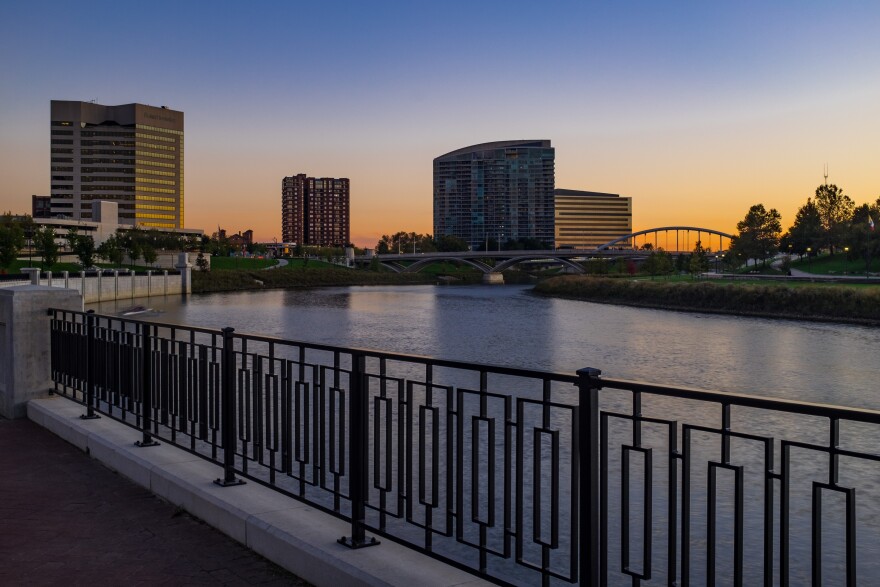WOSU's Letters from Home collects stories about our day-to-day lives during the coronavirus pandemic. This week, a few Ohioans shared their stories on how having COVID-19 has impacted their lives and communities.
Jocelyn Greene from Pataskala
I'm a very active person. I figured I'm good, I won’t catch COVID. But on April 10 at 3 p.m., I started not feeling well and exhausted. I thought it was because it was the end of the day. I went home around 6 p.m., but by then I had a headache. I get migraines a lot so my husband thought it was another of my episodes. By 2 a.m., I had a high temperature and a chill. Throughout Friday, Saturday, and Sunday, I was running a fever, and by Monday, I called the [US Together] office and told them I couldn’t come in.
On Tuesday, I went to the doctor and they took a test for strep; they told me I had the flu. By Wednesday, I was so delirious that my doctor told me to get tested for COVID-19. I didn’t have a cough, so they denied me testing; I went home and took Tylenol instead.
On the seventh day, I started vomiting. My doctor said I needed to be tested again, but I was denied again because I didn't have a cough. It was really frustrating not knowing what I had. My temperature of 104 degrees never really went down. Then, in the second week, I started to cough and had a hard time breathing. We went to the testing facility again, and this time they tested me for COVID due to the cough and my doctor sent me to the ER to have an x-ray on my chest. My lungs were clear and they sent me home once more.
The next day, the Licking County Health Department called me and told me I had tested positive. By that time, I was so delirious I couldn't walk or eat anymore. That morning, my husband rushed me to the ER. I was sent to the ICU and was put on a respirator to help me breathe.
When I was awake, the first thing that I thought about was my family: I should've spent more time with them. I wish I had told my husband “I love you” 100 times. I thought to myself, “I'm going to die. I'm not going to see my children anymore.” For four days, I was breathing through a tube, unconscious.
On the fifth day in the ICU, I woke up. It was so terrifying. After two more days, my temperature lowered, but I was still scared to leave the hospital. The doctor showed me an x-ray of what my lungs had looked like, and I had had COVID-19 pneumonia in my lungs. For a second, I just stood there and cried, because I didn't know how I got it. It was the most terrifying experience of my life.
Having gone through this experience, I am more in tune with spending more time with my family, and I have a better appreciation for life. When I finally got better, every morning when I woke up, the first thing that I said was, “What a beautiful day,” even if it was raining outside. It was a beautiful day because I woke up and I was alive.
I'm not an overly religious person, but every day I thank God for giving me a second life. It really changes your perspective of life when you go through something like this. It's all still so new to me. I was so spoiled—not appreciative of what I had. Material things mean nothing when you are on the brink of death. It means nothing.
Wear the mask. If it's not to protect yourself, it's to protect others. Don't think about yourself - think about your family, your friends, the people you know, think about them and their health. If you are thinking about just yourself, I think that is very selfish, because in the meantime you're not only protecting yourself but your loved ones. Be unselfish. Think about all the lives you will save or protect by wearing a mask.
Transcribed by Lisa Lin as part of a partnership with US Together.
Anonymous from Worthington
I hate that people were treating me like I must have done something wrong. I've worn masks, kept away from parties, shopping, bars, restaurants, etc. Only once did I go to an eight-person dinner and someone there had it. Anyone could get this: Don't treat those that get it like they are being irresponsible.
Sudarshan Pyakurel from Columbus
In the past four months, COVID-19 has shown me how vulnerable we are. The health care system in the U.S. is considered to be one of the best in the world – but when the crisis hit, it was out of my reach when I needed it the most. I learned that minorities and refugees who face a myriad of barriers cannot access basic care. I also became aware that racism is very prevalent within this system.
Those in the refugee community who arrive and cannot speak English face a linguistic and cultural barrier. Let us say, a person who comes to the U.S. in his/her 50s. That particular person lives in a silo, a community like their home countries. Newly-resettled families are fearful to go out and explore things on their own; at the same time, their priority is to feed the family and pay bills.
Most refugee families that we serve live in this duality of mainstream culture and their own societal structure. In their everyday life, they are familiar with a few places where you can track their footprints such as work, market, temple/church, and family and friends.
A fellow community member who was in his 60’s tested COVID-positive. His family sent him to a hospital and could not visit because of COVID-19 restrictions. According to the family, what might have happened to him in the hospital is disturbing. He was partially deaf because of his age and a previous bad ear infection. He had trouble speaking English and could hardly hear. In that case, he could not communicate with the nurses. The family is not sure if the interpreter was involved.
This individual who was admitted had asthma and needed an inhaler. When the ambulance picked him up, his inhaler was left at home. The family did not realize until it was too late. Usually, he would carry the inhaler in his pocket all the time. Obviously, in the hospital he was in isolation, and what happened no one knows. After a couple of days, when a family member found out that his inhaler was at home, they got the news that he did not survive COVID-19.
BCCO (Bhutanese Community of Central Ohio) is a small agency with limited staff. In Central Ohio, the Bhutanese-Nepali population is 25,000-plus. BCCO, a five staff agency that serves Bhutanese-Nepali in Central Ohio, is also struggling just like these families. During the global pandemic, we are doing what we can do from our end, but we no choice but to live this reality.
Transcribed by Lisa Lin as part of a partnership with US Together.

This week, Letters From Home is asking the question: What are your feelings about playing sports this fall?
Answer this question using the form below, and try to keep below 1,000 words. Your response may be edited for length and clarity.








